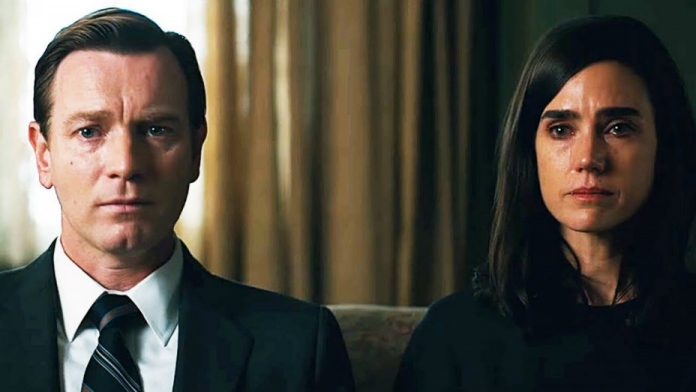Within the opening moments of Ewan McGregor’s directorial debut American Pastoral, we see the actor, also playing the lead role, in flashbacks, purporting to be a high school senior. Then we see Rupert Evans, playing the former’s brother, in an unconvincing, saggy face mask to let us know he’s now supposed to be in his 60s. In both instances, casting different actors to play the respective roles at these points in their life would’ve been preferable, and while this may seem pedantic to point out, when these issues occur early on into proceedings it instantly forms a distance between the film and the viewer, and in the case of his underwhelming drama, it’s one that we’re never quite able to close.
For an audience member’s job is to suspend our disbelief, and that becomes something of a struggle in this endeavour, as we meet McGregor’s Swede Levov when a school celebrity and gifted sportsman, marrying a Miss America contestant, Dawn (Jennifer Connolly), much to his father’s (Peter Riegert) frustration because she’s not Jewish. Years pass and the happily married couple welcome in their one and only child, Merry – who suffers from a stammer, right up into her teens, where she’s then portrayed by Dakota Fanning. It’s during this period where their lives begin to change, as the disenchanted youth begins lashing out at the establishment in the midst of the Vietnam War, and befriends protestors in New York, distancing herself from her family, leaving her beleaguered parents to sit back and watch as their comfortable set-up falls to pieces around them.
The core issue with American Pastoral is the inclination to cover so much ground, and scrutinise over a myriad of themes. That’s not intended to be a negative reflection of the story, as this comes based on a novel by the much celebrated author Philip Roth, but a book has the luxury of time, with no limitations on how much you can fit in, and how long it may be. A mainstream film vying to appease a broad market tends to remain under two hours long, and as such has more restrictions on what can be included, and this film suffers from its distinct lack of focus.
It doesn’t help either that each aspect is so multi-layered in its own right, and to be substantially explored, it requires the space to do so, but we never have time to pause and reflect. From the strained mother/daughter relationship at the core of the narrative, to the political context of the era depicted and the riots taking place in the protagonist’s home town. To the examination of parenting, and where two such ‘ordinary’ people could go wrong, and whether they’re to be culpable for their daughter’s actions. There’s also the study in the change of societal issues and behaviour from when the parents were youths, to their children’s generation, presenting a stark, palpable change.
The one theme that feels most underused, however, is that of the Dawn’s relationship with Merry, as two characters who you could make an argument for as being more intriguing entry points into this tale, as opposed to adopting the perspective of Swede. The problem child narrative is a fascinating one, though for a young girl, she was pretty philosophical at school, for when asked what life is, Merry submitted, “Life is just a short space of time in which we are alive,” as her response. She’s not wrong either, so with that in mind choose how you spend your weekends wisely, and think twice as to whether you wanna see this movie.









